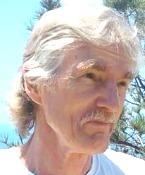Scholar Fridays is a weekly series on Bearings Online where we interview 2017-18 Resident Scholars. Susan Sink recently interviewed James (Jim) Hofmann, who is currently spending the 2017-18 academic year at the Collegeville Institute. Hofmann is Professor Emeritus of Liberal Studies at California State University Fullerton and is working on a project titled “Catholicism and Evolution in Historical and Philosophical Context.” To view previous Scholar Friday interviews, click here.
Tell us about your project.

Jim Hofmann
As an historian and philosopher of science, I am interested in the mutual development of evolutionary biology and Catholic theology throughout the period from Darwin to the present. Scholars who have worked on science and religion issues during this period initially gave more attention to developments among Protestants rather than Catholics. But I find the Catholic context to be a fruitful source of interesting themes.
It is still not entirely clear why there was so much opposition to evolutionary ideas on the part of many influential Catholic theologians during the late nineteenth and early twentieth centuries. Although by the end of the twentieth century strong support developed for theistic evolution as a synthesis of evolutionary science and Catholic faith, there still are intriguing questions to explore, especially since there have been so few official statements regarding evolution on the part of the Church hierarchy.
For example, how is the theological concept of humanity created in the image of God to be understood in concert with a scientific understanding of a contingent evolutionary process driven by random mutation? More generally, what is the best theological framework within which to develop theistic evolution? How has the historical development of Neo-Thomistic theology affected the changing receptivity to evolutionary ideas on the part of Catholic theologians? How does theistic evolution fare when compared to the intelligent design movement as an alternate approach, especially within specific theological frameworks?
These questions all have historical, scientific, philosophical, and theological facets and require an interdisciplinary approach. By addressing them I hope to contribute to an improved public understanding of Catholic contributions to science and religion dialogue in a world in which evolutionary science plays such an important part.
I see you are an alum of Saint John’s University. Was there anything about your undergraduate education here that set you on a path to Philosophy of Science?
Yes, I majored in physics here at Saint John’s from 1965 until my graduation in 1969. Right from the start I was fascinated by the way abstract mathematical ideas can be used to model the complex phenomena found in nature. But although I took plenty of physics and mathematics courses, the humanities curriculum also turned out to be very important in the long run. History, philosophy, theology, and literature courses all left a lasting impression and contributed to my intellectual development. I still have a copy of a 1976 essay written by one of my philosophy professors, Father Ray Pedrizetti, titled “Scientific Knowledge and Religious Faith.”
The broad liberal arts education I received at Saint John’s gave me a permanent interest in the social, historical, and philosophical context in which science takes place. This included an interest in the personal lives of scientists that eventually resulted in the scientific biography I wrote on André Marie Ampère, a nineteenth century French Catholic physicist, chemist, mathematician, and philosopher. I could never have become interested in studying such an eclectic individual without the broad interdisciplinary outlook I first acquired during my time as an undergraduate at Saint John’s.
In what academic discipline do you feel most at home and how does that affect your life as a scholar?
Although some of my research has been focused on technical aspects of nineteenth century physics and twentieth century molecular biology, I am primarily a historian of scientific ideas in their social context, a context that includes philosophy and religion. I consider the analysis of interactions between influential individuals to be essential for understanding how the dialectic of more abstract ideas unfolds. Because my abilities are best suited to historical case studies that illustrate broader themes, I am most at home talking to historians of science and scientists who have historical and philosophical interests.
Scientists in all historical periods have relied upon either philosophical or theological assumptions that serve to motivate or channel their research. Making these presuppositions explicit and analyzing their sources requires both historical and philosophical effort.
If you could have dinner with a single philosopher or scientist, or one of each, who would it be? What would you want to ask?
 Charles Darwin would be a possible choice but, if I had to choose just one person, it would probably be André Marie Ampère. Although not as famous as Darwin, Ampère was a very influential physicist who helped create the science of electrodynamics. Most people only recognize him because his name is used for the unit that measures electric current. Although I have written a biography of Ampère and have read almost everything he wrote, I still do not feel that I know him very well. He was entirely self-educated and still managed to reach the forefront of research in chemistry, physics, and mathematics. Although brilliant and accomplished in so many ways, he had a very unhappy personal life and was also periodically plagued by doubts regarding his religious faith. He loved to discuss epistemology and was driven by a hope that all branches of knowledge could be integrated into a unified synthesis. This hope was never fulfilled, and that was one of the great disappointments of his life.
Charles Darwin would be a possible choice but, if I had to choose just one person, it would probably be André Marie Ampère. Although not as famous as Darwin, Ampère was a very influential physicist who helped create the science of electrodynamics. Most people only recognize him because his name is used for the unit that measures electric current. Although I have written a biography of Ampère and have read almost everything he wrote, I still do not feel that I know him very well. He was entirely self-educated and still managed to reach the forefront of research in chemistry, physics, and mathematics. Although brilliant and accomplished in so many ways, he had a very unhappy personal life and was also periodically plagued by doubts regarding his religious faith. He loved to discuss epistemology and was driven by a hope that all branches of knowledge could be integrated into a unified synthesis. This hope was never fulfilled, and that was one of the great disappointments of his life.
Because Ampère tried to locate the origins of knowledge categories using a fairly rigid approach to human psychology, I would like to know how he would respond to modern developments in neuroscience, cognitive science, and evolutionary arguments about the sources of religious belief. Although he was a contemporary of the French evolutionary theorist Lamarck, Ampère lived just prior to the much more extensive development of evolutionary science later in the nineteenth century. A discussion of the origins of human psychology in our evolutionary history would have been of great interest to Ampère and would result in quite a conversation.
As a liberal studies professor, I’d think you’re comfortable speaking across disciplines and maybe across faith traditions as well. Have you had any “ecumenical moments” or surprising conversations so far here at the Collegeville Institute?
I am very impressed by the way Resident Scholars from a wide variety of religious and social backgrounds make up such a cohesive community at the Collegeville Institute. I have especially enjoyed discussing the history of Christianity in Japan with Toshihiro (Toppo) Takamura. He introduced me to Silence, Shūsaku Endō’s novel about the brutal and systematic persecution of Christians in Japan during the seventeenth century, and we also watched and discussed Martin Scorsese’s film adaptation of the novel. One of the central themes in Endō’s novel is the psychology of religious faith and the way symbolic action, ritual, artifacts, and cultural context all function in both the expression and denial of faith. Because my own experience and study of Christianity has been limited to Europe and the United States, it was quite rewarding to be introduced to Japanese Christianity by such a well-informed and engaged member of that community.
What are you reading for pleasure?
I enjoy reading nineteenth century novels by many European authors. However, I also recently read Cold Mountain by Charles Frazier and when I want relaxation I often turn to Robert Louis Stevenson.
Like this post? Subscribe to have new posts sent to you by email the same day they are posted.



Leave a Reply